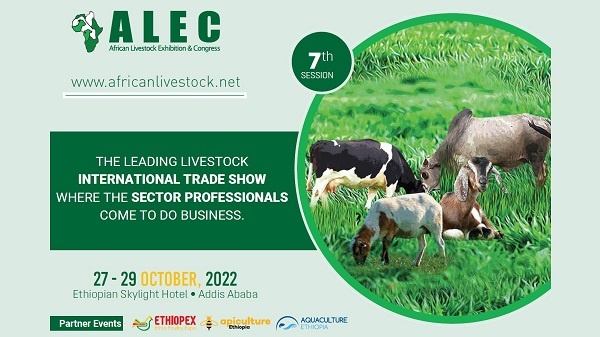
EVENT: The 7th Session of the African Livestock Exhibition & Congress (ALEC 2022)
The leading Animal Husbandry International trade show
DATE: October 27 – 29, 2022
VENUE: Ethiopian Skylight Hotel, Addis Ababa, Ethiopia
About the African Livestock Exhibition & Congress (ALEC)
Established as the must-attend annual livestock event in East Africa, ALEC attracts global players, key regional stakeholders, and professionals in the sector who value the power of learning, networking, and business.
Having attracted over 3,000 professional and trade visitors in 2021, we are once again ready to welcome you and offer your company unlimited opportunities to grow your network and make new business connections at the 7th ALEC scheduled to be held from 27 – 29 October 2022 at the Ethiopian Skylight Hotel.
This is the perfect venue for your business to grow in the East African market and especially in Ethiopia, the largest livestock market in the whole of Africa.
Why Attend ALEC?
ALEC is the largest gathering of animal science and trade professionals in the East Africa region. The 2022 edition of the event is expected to welcome 100+ exhibiting companies and 4,000+ attendees from 20+ countries. Companies benefit from participation in many ways, including:
Promote your business and brand: ALEC exhibitors get significant brand exposure before, during and after the event through our marketing activities. Take the chance to be part of this event and Strengthen (or establish) your brand image in the industry.
Meet new companies that can help your business: ALEC supports your entry strategy by connecting you to the right distributors and facilitating profitable partnerships. ALEC also offers you experts’ insights into the local regulations so you can better understand and navigate the market.
Increase brand awareness: An exhibition stand at ALEC 2022 will help your company get noticed, as it’s the perfect opportunity to get directly in front of your target audience.
Learn about your industry: Learn about new developments in your industry, use the opportunity to stay current with the market trends, advancements and keep ahead of your competition in one of the fastest growing markets.
Network with individual leaders and potential buyers: Connect with potential clients and partners at ALEC where 86% of the attendees are decision makers.
- More on Why Attend ALEC
About the livestock sector
According to FAO, livestock contributes to nearly 40% of the total agricultural output in developed countries and 20% in developing ones, supporting the livelihoods of at least 1.3 billion people worldwide. Livestock products are pillars of the global food system. Projections show that the demand for animal-source foods will grow rapidly in the African continent due to growth in the human population, increasing consumer purchasing power, and urbanization. Thus, producers and other actors will invest significantly in livestock farming systems and value chains. The future of African Livestock will influence the development of the entire continent. We must build today for the foundations to steer livestock on a sustainable development trajectory in the future.
ALEC has proved to be a valuable platform to bridge the various gaps in the livestock value chain by attracting numerous first-class exhibitors to do business and share their knowledge with sector stakeholders besides attracting investment, transfer technology and serve as professional development forum in one place a time. ALEC is the primary and significant event for the livestock sector development in East Africa sub-region and mainly Africa’s most considerable livestock populated country of Ethiopia. Ethiopia’s human population is anticipated to grow to almost 200 million in 2050, with the share of urban population almost doubling to nearly 40% over the same period. GDP per capita is expected to grow from less than USD 700 in 2015 to over USD 5500 in 2050. The growing demand for livestock products will provide incentives for livestock farmers to expand their livestock assets, increase productivity through intensification, and use their animals as a vehicle for prosperity.
Source: africanlivestock.net
